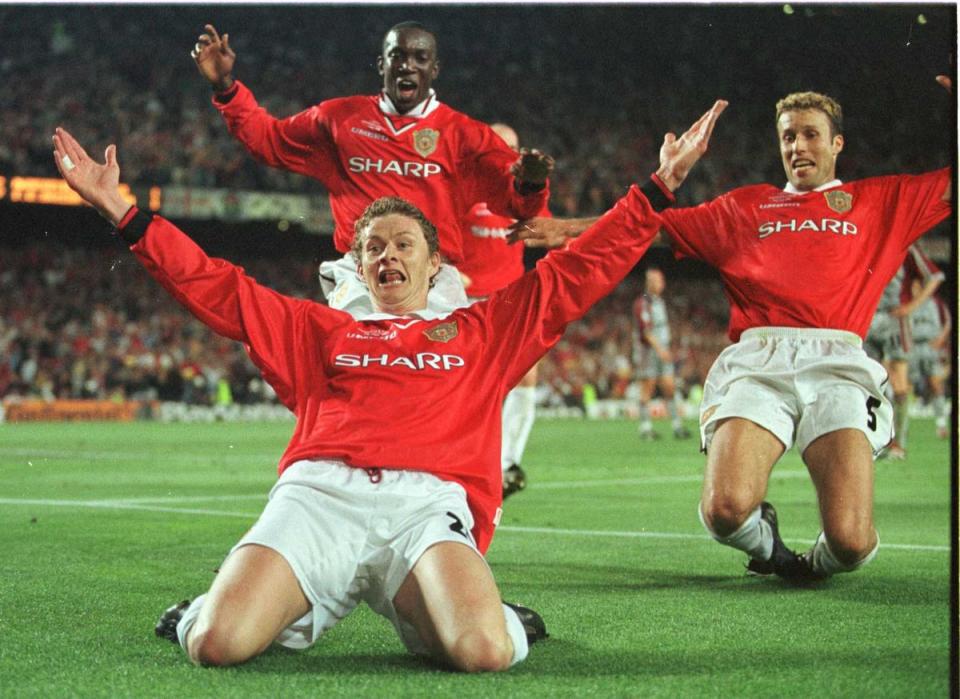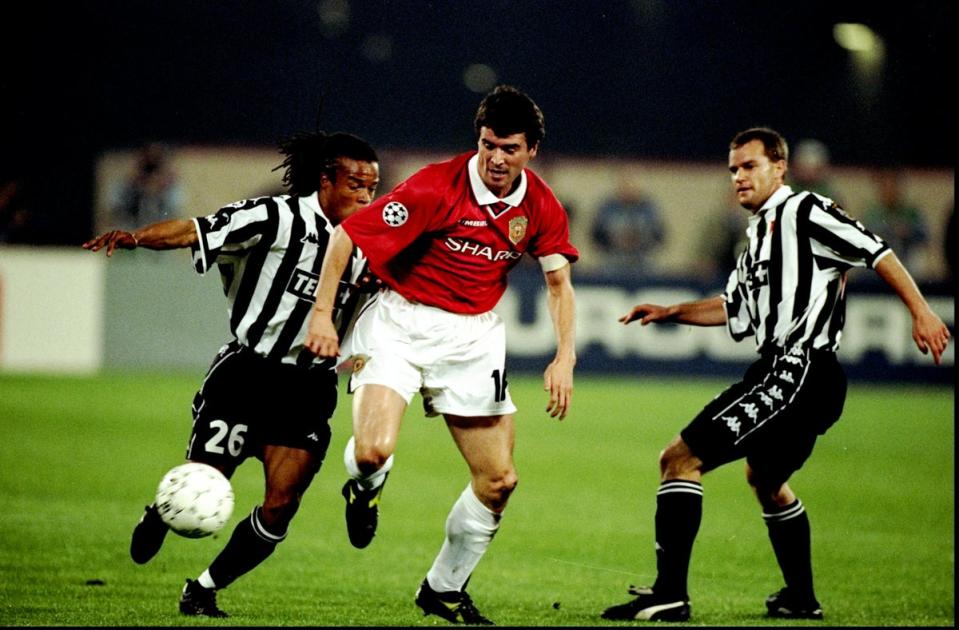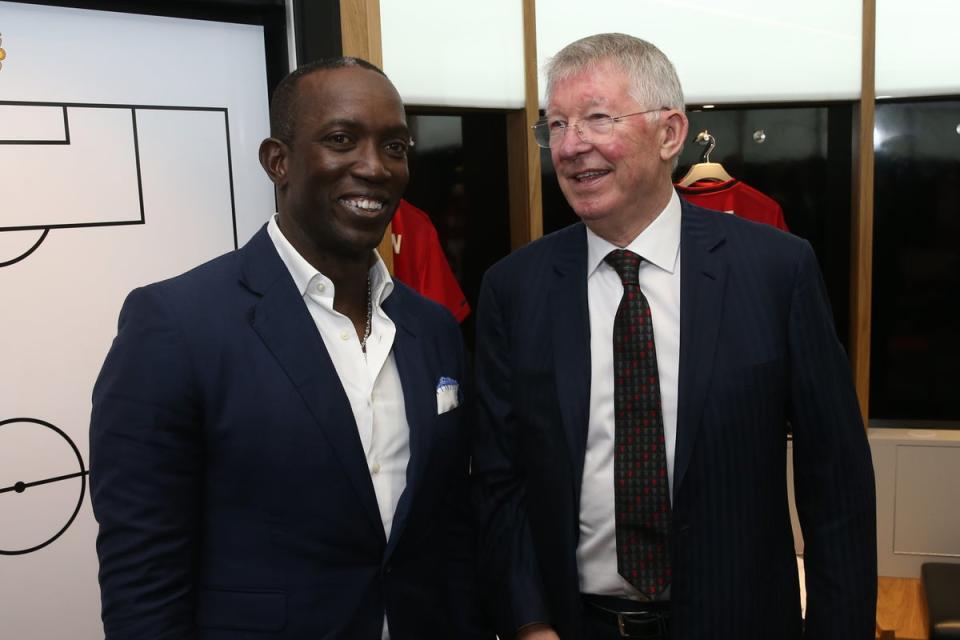There was a time when television executives of historical dramas rushed to use the writings of Jane Austen, not the musings of Phil Neville. Although that was the 1990s, a decade that spawned a growth industry in Manchester United nostalgia. That, given that the last quarter century has taken them from ‘football, bloody hell’ to ‘football, bloody mess’, is perhaps not surprising. For them, the past is infinitely preferable to the present.
After Netflix’s David Beckham documentary comes Amazon’s ’99; made by the same production company, covering some of the same ground, with many of the same faces; most of the stories are familiar, the images worn but still chilling. United’s best season is ripe for an overhaul, if only to distract them from one of their worst campaigns that anyone under 40 can remember. It has created several legacies. Last week a story emerged that criticism of the military-industrial complex from high-profile Old Trafford old boys could deter potential candidates from wanting to manage the club.
And it feels like we’re never far from former Manchester United players tipping Manchester United to win, watching Manchester United lose and complaining that Manchester United isn’t what Manchester United used to be and saying what Manchester United should be. This could all be a product of 1999. Because much of the third episode – it’s no coincidence that there are three, as it documents a historic treble – concerns a Champions League final in which Sir Alex Ferguson got his team selection and tactics wrong. His side largely played poorly and had hammered could have been, but won because it was Manchester United.
Because it would have been Sir Matt Busby’s 90th birthday, because it was Ferguson’s overarching ambition, because it was their destiny, their character, their nature. None actually provided a formula after Ferguson retired, leaving his loyalists as bewildered as their successors struggled. Compared to many a more recent team, United have not triumphed because of tactics or football philosophy. They won because they did.


Now a group of middle-aged men – and octogenarian Ferguson – return in time, with monotone Mancunian tones and lilting Scandinavian voices reliving the remarkable. “What were the high notes?” asks Andy Cole. “There was no such thing.” Which, given that clubs from other countries had created their own trebles, may not be factually accurate, but still adds to the legend.
Not that it needs that. Much of it remains astonishing: Roy Keane’s selfless tour de force against Juventus, Peter Schmeichel’s penalty save from Dennis Bergkamp, the biggest goal of Ryan Giggs, Teddy Sheringham and Ole Gunnar Solskjaer’s lives at Camp Nou. There is Beckham’s redemption story, Paul Scholes still haunted that, like Keane, he missed the Champions League final. United’s relegation in 1974 is as close as it is today. If it makes it ripe for reminiscing, perhaps its relationship with the modern game is increasingly distant. Then it was even less cleaned.
Perhaps a documentary on Manchester City’s more recent treble in the late 1940s will reveal that Bernardo Silva hated Ilkay Gundogan who punched Nathan Aké, who refused to talk to Ruben Dias, who told Manuel Akanji to leave for Switzerland in a sports car . . But probably not.
Yet – and although Solskjaer, whose happy place remains 1999 Old Trafford, speaks of them all being friends – United’s team spirit came despite or because of their personality conflicts. There was Schmeichel and Keane, fighting in a dressing room; “Two animals, they didn’t get along,” says Gary Neville. Cole remembers trying to hit Sheringham. The striker remembers an argument with Keane. “He said, ‘Why don’t you take your Ferrari back to London?’” An assist and a goal in a Champions League final later, perhaps even Keane was pleased that Sheringham had not taken his advice.


The cast list of interviewees is impressive and extensive. Beckham brings smiling charisma, Schmeichel candid insight, Dwight Yorke a zest for life, Sheringham a willingness to accept that some people didn’t like him, Henning Berg about three sentences to prove that the filmmakers interviewed Henning Berg. Only one man is missing: Keane, a great contrarian, but probably because of his pronounced unwillingness to mythologize. Ferguson, who often harbors a grudge, is ignoring a feud dating back to 2005 and paying generous tribute to his captain.
The Irishman intimidated opponents. But most of all, he intimidated Jesper Blomqvist, a gentle soul who feels unsuited to an unforgiving environment. Nicky Butt recalls Ferguson’s reaction to the 1998 defeat to Monaco. “It’s your fault,” said his manager. “Thanks to you I’m out of the European Cup.”
Maybe it was a more brutal time, maybe just a completely different one. The contrasts are drawn in a group that can handle it. Cole regrets having a threesome. Phil Neville regrets fouling Ray Parlour. If Beckham wishes he could go back to when United won the Champions League, Yorke wishes he could party like it was Christmas 1998; Gary Neville organized the transport and Yorke oversaw the debauchery for an epic evening that apparently inspired an unbeaten run that started in December and spanned the rest of the season.
Like comfort viewing, it’s entertaining but unsurprising, stripped of the unpredictability that United’s season showed at the time, but it’s the antidote to their current shortcomings. There are few actual revelations, although Gary Neville is surprised to discover that Ferguson handed in his resignation at the start of the season and then withdrew it. Chairman Martin Edwards appears to be claiming he motivated the motivator by restoring Ferguson’s focus in a way that prompted the Scot to threaten to quit.


Another stimulating factor was Arsenal’s double in 1998. “The previous season everyone had swallowed the Arsenal bible,” chirps Phil Neville. “Vitamins and pasta used to make me angry.” Bury full-backs also had vitamins and pasta, but they didn’t like to talk about it and no one praised them for it.
But at the time, no one thought United’s treble was down to nutrition or sports science. It was because they were Manchester United. And 25 years later, those looking for a reprieve from the 2024 team, a happy ending or a truly great sports story can enjoy the clips of historical brilliance as Gary Neville sits next to a bath and waxes endlessly eloquent about the glory days and the United States. knew.
::99 will be available exclusively on Prime Video on May 17, when all three installments will be released worldwide.
If you’re not an Amazon Prime Video subscriber, get started here you can request a free 30 day trial. We may earn commission from some of the links in this article, but we never allow this to influence our content. This income helps fund The Independent’s journalism.